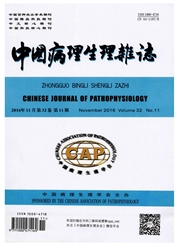

 中文摘要:
中文摘要:
目的:观察提高抵抗素水平对小鼠血糖和胰岛素敏感性的影响。方法:将载有抵抗素基因的重组腺病毒经尾静脉注射构建高抵抗素血症小鼠模型,与正常对照组及对照病毒组比较小鼠空腹血糖和胰岛素水平,并通过腹腔糖耐量试验及腹腔胰岛素耐量试验观察小鼠糖耐量及胰岛素敏感性的变化。结果:尾静脉注射重组腺病毒第5d可获得血中抵抗素高表达,构建高抵抗素血症小鼠模型。与正常对照组及对照病毒组相比,血抵抗素升高对小鼠空腹血糖没有影响,但导致空腹胰岛素水平升高,糖耐量减低和胰岛素敏感性下降。结论:抵抗素水平升高可影响小鼠糖代谢,可能与2型糖尿病发病相关。
 英文摘要:
英文摘要:
AIM: To establish the animal model of hyperresistinemia and to observe the effects of resistin on glucose metabolism and insulin sensitivity in vivo. METHODS: We established a mouse model of hyperresistinemia in C57BL/6 mice by intravenous administration of the recombinant adenovirus encoding mouse resistin. Then we observed the fasting blood glucose and insulin levels. We also investigated glucose tolerance by IPGTT, and insulin sensitivity by IPITT. RESULTS: On 5 d after the injection, the concentration of plasma resistin was more than 15 -fold higher in Adv -resistin - EGFP - treated mice than that in saline - or Adv - EGFP - treated mice. In the fasting state, no difference in glucose levels was observed among three groups. However, mice injected with Adv - resistin showed higher insulin levels, impaired glucose tolerance and insulin sensitivity. CONCLUSION: Hyperresistinemia affects glucose metabolism in mice and it may play an important role in the pathogenesis of insulin resistance and type 2 diabetes.
 同期刊论文项目
同期刊论文项目
 同项目期刊论文
同项目期刊论文
 期刊信息
期刊信息
